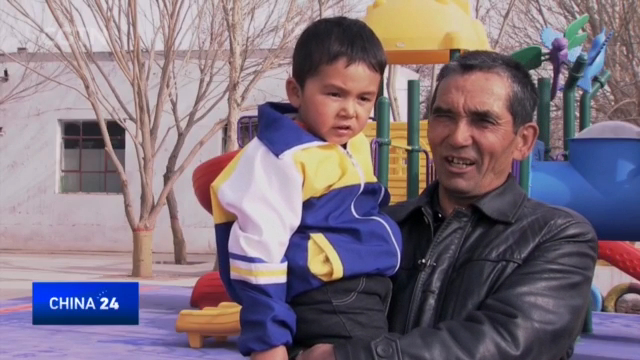
21:47, 15-Mar-2019
Counter-Extremism: Village in Xinjiang sees major transformation
Updated
21:40, 18-Mar-2019
03:29

China's Xinjiang Uygur Autonomous Region is taking measures to ensure against an environment that breeds terrorism or religious extremism. In one town near Kashi, officials say the changes are obvious. CGTN's Cui Hui'ao visited that village.
Shuffling the head, and moving the body, this is the traditional Uyghur dance. At this kindergarten in Shufu County of Kashi, a group of toddlers are having some fun, which is part of their daily curriculum.
Founded just two years ago, the kindergarten now has around 230 students, all of them are of Uyghur ethnicity.
PARENT "My son started here last year. We don't pay a penny. He eats three meals a day at school, and books and heating are free too."
At a typical language class, two teachers are instructing at the same time, speaking in both Mandarin and Uyghur languages to the students.
AMINA ABUDUREHEMAN, TEACHER NO. 7 VILLAGE KINDERGARTEN "We believe teaching students Mandarin will make it easier for them to communicate with people of different ethnicities. And learning Uyghur language is equally important because it is part of their ethnic identity."
Bilingual education is now a common feature in Uyghur kindergartens and schools in Xinjiang. Improved educational quality has led to more Uyghur parents willingly putting their children in local kindergartens. A couple blocks from the kindergarten, this hair salon tells another story about the change that this village of 3000 people has experienced. Twenty-nine-year-old Alanisha Abulimiti opened the salon last year. Thanks to a local women's federation, which organized free hairdressing training for people like her, the cost of equipment and rent are fully covered. Now Alanisha makes around 2-thousand RMB per month, comfortable enough to live on in this village.
ALANISHA ABULIMITI LOCAL VILLAGER "Women in our village used to be afraid to go to the hair salon, putting on makeup or even dressing themselves, because those things were not allowed in the eyes of extremists. Now, the environment has changed."
Alanisha says she is finally doing her dream job, making women in her village feel as pretty as they want. Speaking on these changes, 46-year-old Wei Bangzhong, the party secretary of this village, shared some more examples.
WEI BANGZHONG, PARTY SECRETARY NO. 7 VILLAGE, SHUFU COUNTY OF KASHI "Three years ago, some Uyghur residents would reject government subsidized services like television because they thought of it as non-Muslim influence. They would stare at Han people in the street with hostility. We spent a lot of effort helping them become more open-minded, learning about the outside world, and understanding the government's policies."
In order to better communicate with local villagers, Wei began learning the Uyghur language on the day he arrived. The local government has been providing all kinds of material and industrial support needed, such as free tuition and vocational training, to improve villagers' living. Wei is proud that his work has paid off. Cui Hui'ao, CGTN, Xinjiang Uyghur Autonomous Region.

SITEMAP
Copyright © 2018 CGTN. Beijing ICP prepared NO.16065310-3
Copyright © 2018 CGTN. Beijing ICP prepared NO.16065310-3